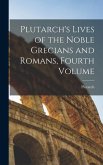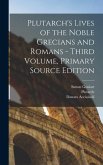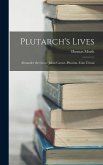This hardcover anthology of Plutarch's biographies boasts an excellent and highly readable translation by two scholars of classical literature. In this volume, we hear Plutarch's accounts of several iconic figures from Greek and Roman antiquity. Nominally arranged according to their moral successes and failings of the individuals concerned, the Lives are a stunning insight into how the figures of antiquity were perceived and chronicled relatively soon after passing into history. Written in the 2nd century A.D., the Lives were distributed en masse following the invention of the printing press in the early Renaissance. As well as being compelling biography, certain accounts of rulers such as Pericles are highly regarded as secondary sources by contemporary historians. In multiple cases, Plutarch compared and contrasted several of his biographical subjects. For instance early in this volume we find comparisons between Theseus and Romulus, wherein their morals, characteristics and actions are examined.
Hinweis: Dieser Artikel kann nur an eine deutsche Lieferadresse ausgeliefert werden.
Hinweis: Dieser Artikel kann nur an eine deutsche Lieferadresse ausgeliefert werden.








